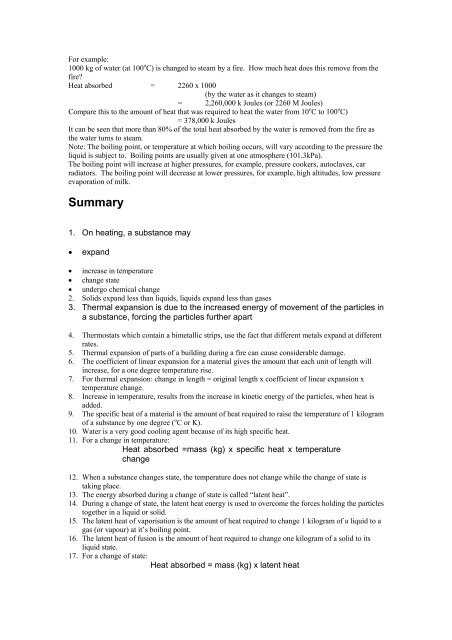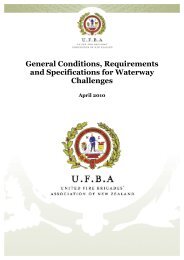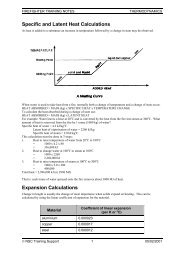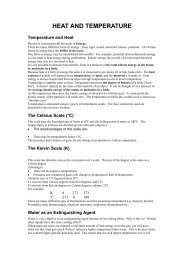THE EFFECTS OF HEAT ON MATTER
THE EFFECTS OF HEAT ON MATTER
THE EFFECTS OF HEAT ON MATTER
You also want an ePaper? Increase the reach of your titles
YUMPU automatically turns print PDFs into web optimized ePapers that Google loves.
For example:<br />
1000 kg of water (at 100 o C) is changed to steam by a fire. How much heat does this remove from the<br />
fire?<br />
Heat absorbed = 2260 x 1000<br />
(by the water as it changes to steam)<br />
= 2,260,000 k Joules (or 2260 M Joules)<br />
Compare this to the amount of heat that was required to heat the water from 10 o C to 100 o C)<br />
= 378,000 k Joules<br />
It can be seen that more than 80% of the total heat absorbed by the water is removed from the fire as<br />
the water turns to steam.<br />
Note: The boiling point, or temperature at which boiling occurs, will vary according to the pressure the<br />
liquid is subject to. Boiling points are usually given at one atmosphere (101.3kPa).<br />
The boiling point will increase at higher pressures, for example, pressure cookers, autoclaves, car<br />
radiators. The boiling point will decrease at lower pressures, for example, high altitudes, low pressure<br />
evaporation of milk.<br />
Summary<br />
1. On heating, a substance may<br />
• expand<br />
• increase in temperature<br />
• change state<br />
• undergo chemical change<br />
2. Solids expand less than liquids, liquids expand less than gases<br />
3. Thermal expansion is due to the increased energy of movement of the particles in<br />
a substance, forcing the particles further apart<br />
4. Thermostats which contain a bimetallic strips, use the fact that different metals expand at different<br />
rates.<br />
5. Thermal expansion of parts of a building during a fire can cause considerable damage.<br />
6. The coefficient of linear expansion for a material gives the amount that each unit of length will<br />
increase, for a one degree temperature rise.<br />
7. For thermal expansion: change in length = original length x coefficient of linear expansion x<br />
temperature change.<br />
8. Increase in temperature, results from the increase in kinetic energy of the particles, when heat is<br />
added.<br />
9. The specific heat of a material is the amount of heat required to raise the temperature of 1 kilogram<br />
of a substance by one degree ( o C or K).<br />
10. Water is a very good cooling agent because of its high specific heat.<br />
11. For a change in temperature:<br />
Heat absorbed =mass (kg) x specific heat x temperature<br />
change<br />
12. When a substance changes state, the temperature does not change while the change of state is<br />
taking place.<br />
13. The energy absorbed during a change of state is called “latent heat”.<br />
14. During a change of state, the latent heat energy is used to overcome the forces holding the particles<br />
together in a liquid or solid.<br />
15. The latent heat of vaporisation is the amount of heat required to change 1 kilogram of a liquid to a<br />
gas (or vapour) at it’s boiling point.<br />
16. The latent heat of fusion is the amount of heat required to change one kilogram of a solid to its<br />
liquid state.<br />
17. For a change of state:<br />
Heat absorbed = mass (kg) x latent heat
















